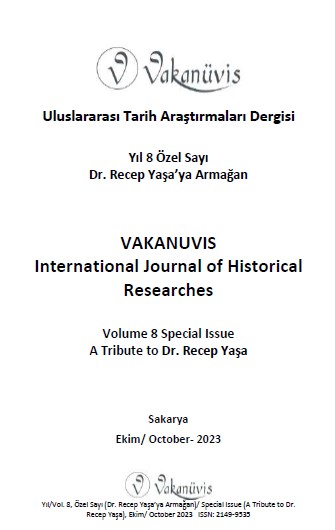XII. ve XIII. Yüzyıllarda Türkiye Selçuklu Hükümdarlarının Uyguladıkları Ekonomik Politikalar ve Bunların Ahiliğin Gelişimine Etkileri
The Economic Policies Implemented by the Seljuk Sultans of Turkey in the XIIth and XIIIth Centuries and the Effects of these Policies on the Development of Akhi-Order
Author(s): Rıfat İlhan ÇelikSubject(s): Economic history, Economic policy, Economic development, 6th to 12th Centuries, 13th to 14th Centuries
Published by: Serkan YAZICI
Keywords: Turkish Seljuks; Akhi; Economic Policies; Social Policies; Merchants;
Summary/Abstract: The article deals with the economic policies of the Turkish Seljuk Sultans Gıyâseddin Keyhüsrev I (1205-1211), Izzeddin Keykavus I (1211-1220) and Alâeddin Keykubad (1220-1237) periods and the effects of these policies on the development of the Akhi-order. In this context, the occupation of ports such as Antalya, Alanya and Sinop by the Turkish Seljuks and its effects on the Seljuk economy are mentioned in the context of the activities of the merchants. The Turkish Seljuk state, which has strengthened its political and military position since the end of the XIth century, also develops economically and socially. Among these institutions, Akhi Organization comes first. Those who are included or not within Akhi Organization contribute to the development of these commercial activities and production. During the period of Kılıç Arslan II, the security of trade, the increase in production, the development of industry, provided because of the development and expansion of the caravanserais, which were established to ensure the development of trade in Anatolia, provided resources for domestic and foreign trade. In addition to agriculture and animal husbandry, which are the basic production models, the establishment of markets and industrial sites, which are the center of international trade, makes Anatolia one of the few countries in the world in economic terms. The role of Ahi-order is great in the organization and development of production activities in Seljuk cities. Akhi-order, which had a hierarchical structure among themselves, were trying to produce in standard quality under the management of Ahi Babas. As well as there were merchants from all over the world in important Anatolian cities such as Konya, Aksaray, Kayseri, Sivas and Erzurum, Seljuk merchants were going to almost every part of the world for the purpose of trade.
Journal: Vakanüvis- Uluslararası Tarih Araştırmaları Dergisi
- Issue Year: 8/2023
- Issue No: Sp. Issue
- Page Range: 2374-2410
- Page Count: 37
- Language: Turkish

